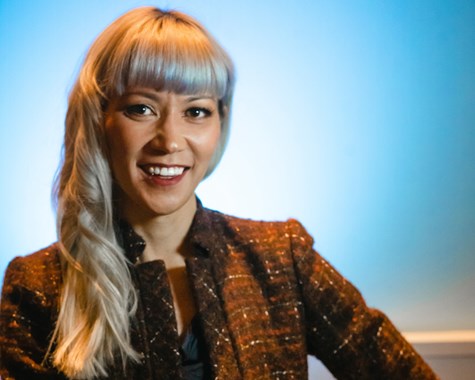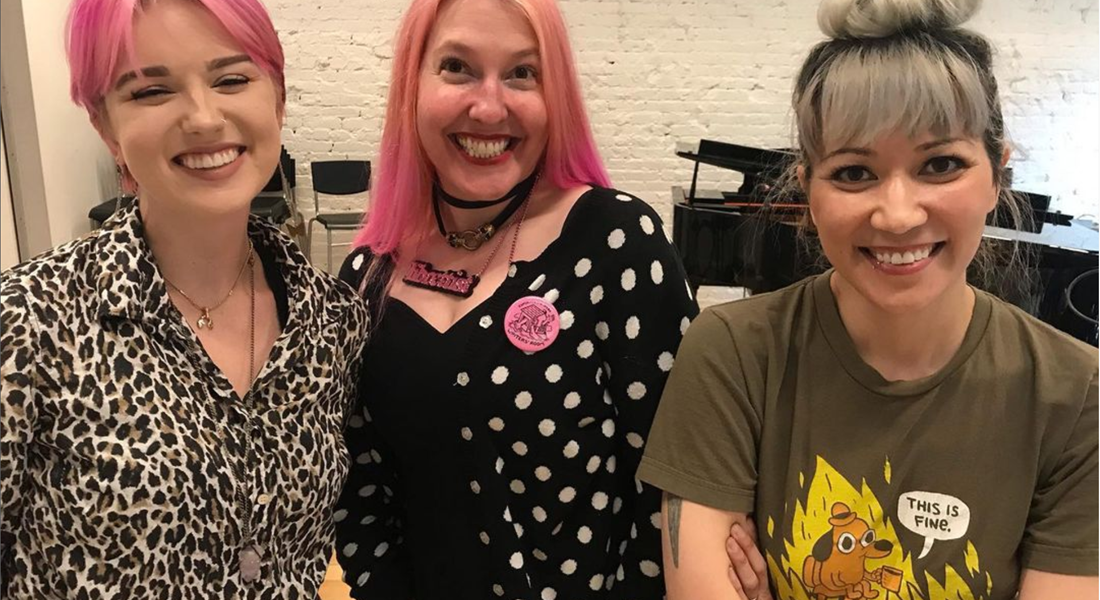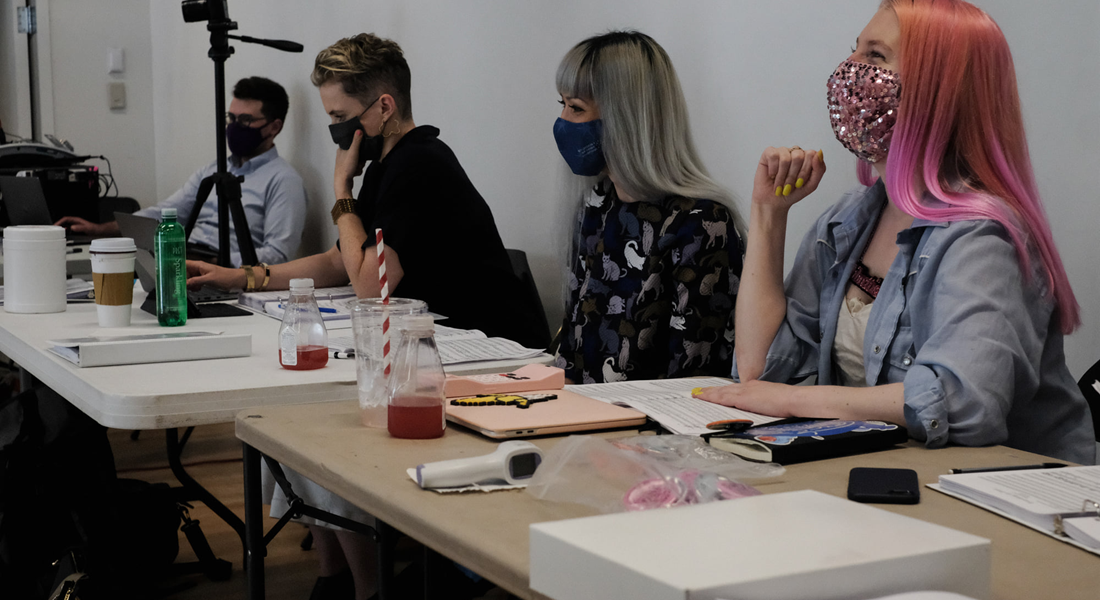Posted24 May 2023
- In
Q&A with composer Melissa Dunphy
Melissa Dunphy is a Philadelphia-based composer and friend of Opera Philadelphia. Melissa has shared her professional insights as a panelist for Reflection & Re-Vision and her music has been part of programs such as Organ Stops. You can hear her work in Episode 6 of Everything for Dawn, a series from Experiments in Opera created by a writers' room of composers and librettists, now streaming on the Opera Philadelphia Channel.
How did you become a composer, and what specifically drew you to opera?
I grew up playing the piano, violin, viola, and singing, and have been obsessed with opera since my teens; my allowance went toward a student subscription to the Lyric Opera of Queensland in Brisbane, Australia, which I would attend by myself because none of my friends or family were interested. My favorites included Mozart’s Don Giovanni, Wagner’s Die Walküre and John Moran’s The Manson Family (it was the nineties, after all, and I was a baby goth). After high school, I briefly attended medical school in Sydney, but quickly realized it wasn’t for me. I spent a few years working various jobs and performing as an actor and in rock bands until I fell in love with an American (this September, we'll be celebrating our 20th wedding anniversary!) and moved to Pennsylvania in my early twenties.

In 2004, I was acting in a production of A Midsummer’s Nights Dream at Harrisburg Shakespeare Festival when the composer for the show dropped out and I was asked to step in at the last minute. In one late-night frenzied work session, I suddenly realized that composing is what I wanted to do for the rest of my life, so even though I was older than the typical college student at 24, I went back to school to study music composition. I feel really lucky that the 2:00 a.m. epiphany I had nearly 20 years ago has led to pretty much the exact career I imagined! With my background in theater, I’ve always been drawn to vocal music—I often talk about how setting texts feels just like preparing a monologue as an actor—and given my obsession with the art form, it was inevitable that I would eventually write operatic works. I launched my career with the Gonzales Cantata, written while I was a student at West Chester University, and I wrote the first act of a full-length opera about the sex life of Ayn Rand for my Ph.D. from the University of Pennsylvania.
Are there composers who have written for the screen who have inspired your own work?
Another of my life-changing musical obsessions has been the band Nine Inch Nails. I’ve always thought that Trent Reznor’s music was cinematic and narrative, so it makes sense that he is perhaps better known now as an Oscar-winning film composer than for the music that introduced his work to me. People who know Nine Inch Nails’ music well can probably find one or two rhythms and harmonies that have crept in from my years of listening to Trent’s music.
What was it like to be a part of a project where multiple compositional styles would be included?
I give a lot of credit to Experiments in Opera for choosing composers whose styles complement each other, even though they are very different. During the composition process, we weren’t necessarily privy to what other composers were writing, so there is a lot of trust involved in anticipating that the complete opera will be cohesive. I was so pleased at the premiere screening, however, to see how well the episodes tell the full story, both musically and narratively. Each episode takes place at a different time in the storyline, but the libretti are so well written that the composers were able to respond to them in a way that perfectly honors the characters and plot.

Your episode of Everything for Dawn sees Dawn struggling through a lot of difficult emotions, how did you think about what she was going through, and how did you convey that through the music?
I went into some more detail about this in my interview with Olivia Giovetti at VAN Magazine: I coincidentally have a very personal connection to Dawn’s story, something that Experiments in Opera was not aware of when they first assigned me to compose Episode Six, in which Dawn visits her father in a psychiatric ward. I grew up with a mentally ill mother, and my own experiences had a direct influence on both the text and music; librettist Krista Knight and I worked together to make sure that the emotions and reactions of teenaged Dawn visiting her father were authentic and accurate. Digging into those memories and finding the right music to portray them was both challenging and cathartic. It was important to me to present each of the characters, and especially Dawn, as complicated humans capable of a whole range of traits and intentions—some admirable, some not so much, but all understandable given who they are and the gut-wrenching situation they’re living through. I also wanted to make sure that there are moments of humor in the heartbreak, because some of my clearest memories from the time I’ve spent visiting my mother involved paradoxical side-splitting laughter. There's something very rewarding about setting words that are so honest and familiar, even though this is ultimately Dawn's story.
You’re also a professor at Rutgers. Do you think projects like this help your students and younger audiences connect with opera?
Something I love about the next generation of composers is that, like me, they are not wedded to a particular style of music or traditional idea of what opera looks like. The music in Everything for Dawn draws upon pop genres like electronica, rock, and Broadway, as well as what might be termed “classical music,” which I think is a reflection of what we are exposed to in the 21st century, with the ease of access that the internet provides. This project ultimately became a film because it was impossible to mount a live opera during COVID, but releasing it online also means that it is far more accessible than a live performance in an opera house. My hope is that this will be an entry point, not only for younger audiences, but for anyone who wasn’t the kind of weirdo who bought an opera subscription as a teenager.

How would you like to see opera evolve, or what do you want to see more of in opera?
Something I find frustrating about opera is that the wider public has an impression that it was “frozen” at some point in the early 20th century. A lot of opera companies barely produce operas later than Puccini, and there’s a stereotype that opera tells old-fashioned or historical stories, which was not true when most popular operas were composed. If we want opera to continue as a vital genre rather than a museum, it needs to reflect the modern world with stories that are authentic to our contemporary experiences. I’m really proud to live in a city with an opera company that is committed to fostering new works. Many other major houses see these as risky, but I think it is far riskier to persist with a century-old canon that doesn’t grow.
What do you do in your spare time and what are your favorite things about living in Philadelphia?
All of my spare time is taken up by my other love, citizen archaeology! In 2015, my husband Matt and I bought a property on the border of Old City and Northern Liberties, and buried in the foundation, we discovered two privies (toilet pits) from the 18th century, containing thousands of artifacts from around the time of the Revolutionary War. Overnight, we became amateur archaeologists, and our entire home is now filled with these artifacts, which we clean, assemble, and research. We are now collaborating with archaeologists at the National Park Service, Museum of the American Revolution, and Colonial Williamsburg, who are helping us learn everything we can about the objects we found and the people who used them. Of course, since I’m a composer, this new obsession has led to several musical projects, including an archaeology opera, Alice Tierney, that I just wrote for Oberlin Conservatory, which was premiered there and presented by Opera Columbus this year. If you’re curious to know more, I was profiled last year in the Philadelphia Inquirer, and Matt and I also have a podcast that details all our archaeology exploits, The Boghouse. The trajectory of my life could not have happened in any city but Philadelphia; I adore this city for its arts scene, its grittiness, and the wild adventures I have lived ever since moving here in 2009.
Leave your comment below.

 Facebook
Facebook Twitter
Twitter More
More